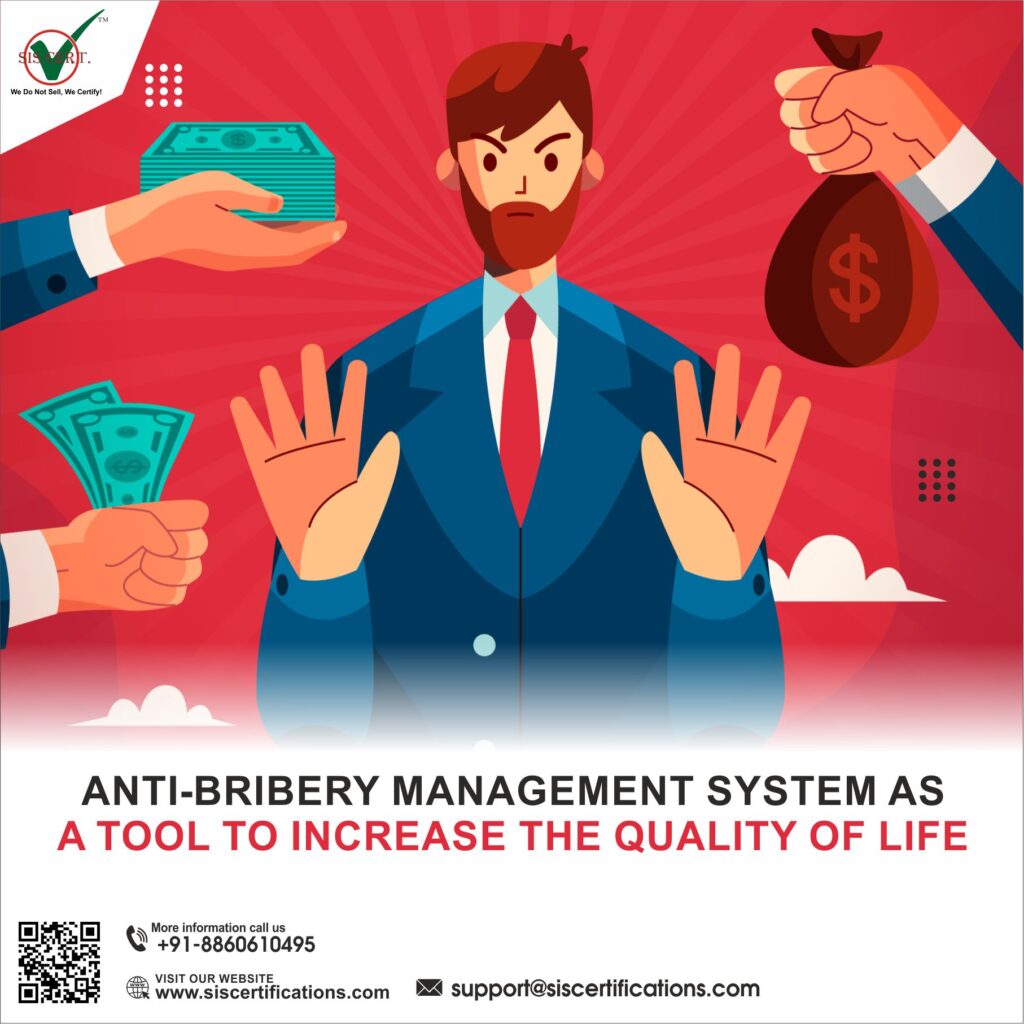Anti-Bribery Management System as A Tool to Increase the Quality of Life

Introduction ⮯ Everyone strives for self-realization via the use of available resources and aspires to live a decent life. A quality of life can be used to explain all characteristics connected to that objective. A decent existence includes living in a world free of corruption. Corruption is at least as old as Adam’s apple. Bribery is the act of directly or indirectly offering, promising, providing, accepting, or soliciting an advantage as an inducement or reward for someone acting-or refraining from acting-in connection with the performance of that person’s duties. Regardless of the level of social and economic progress, corruption exists in all nations. Where the public and private sectors converge, it is most likely to happen. It might be split into two primary groups:- Petty corruption:- Public employees who may be badly underpaid and who depend on minor rent payments from the public to support their families and pay their children’s school fees engage in petty corruption. Grand corruption:– high-ranking governmental officials who decide on major public contracts. Bribery increases the cost of doing business, distorts competition, misallocates resources, threatens market efficiency and predictability, promotes illegal and unethical behaviour, erodes public support for the rule of law, threatens development initiatives, and slows economic growth. The expenses of bribery have a significant impact on quality of life. The Link Between Corruption and Quality of Life: Exploring the Impact on Society ⮯ Corruption has a profound impact on the quality of life within a society, with far-reaching consequences for its citizens. The link between corruption and various aspects of societal well-being has been extensively studied, shedding light on the detrimental effects it can have on social inequality, economic growth, trust in institutions, and the improvement of public services. One of the most evident consequences of corruption is its contribution to social inequality. When resources are misappropriated or embezzled by corrupt individuals or entities, it exacerbates disparities between the rich and the poor. This creates a cycle of poverty and limited access to essential services such as healthcare, education, and infrastructure for those who need them most. Furthermore, corruption hampers economic growth by distorting market mechanisms and discouraging foreign investments. It undermines fair competition and creates an environment where bribery and favouritism prevail over merit-based decision-making. As a result, businesses may hesitate to invest in countries plagued by corruption, leading to reduced job opportunities and overall economic stagnation. Trust in institutions is another casualty of widespread corruption. When citizens witness their leaders engaging in corrupt practices without being held accountable, it erodes their faith in government bodies responsible for upholding justice and fairness. This erosion of trust can lead to social unrest, political instability, and a loss of confidence in democratic processes. Moreover, public services suffer greatly under corrupt regimes. Funds meant for infrastructure development or improving healthcare systems often end up lining the pockets of corrupt officials instead. This not only deprives citizens of essential services but also perpetuates a culture where systemic inefficiencies persist due to a lack of accountability. The link between corruption and quality-of-life indicators is undeniable. It breeds social inequality by diverting resources away from those who need them most while hindering economic growth through unfair practices that discourage investment. Trust in institutions is shattered as citizens witness impunity among corrupt individuals holding positions of power. Lastly, public services bear the brunt of corruption, leaving communities without adequate access to essential services. To improve society and enhance the quality of life, combating corruption must be a priority at all levels. The Benefits of an Effective Anti-Bribery Management System on Individuals and Communities An effective ISO 37001 Certification standard can have numerous benefits for both individuals and communities. By combatting corruption and bribery, such a system ensures better access to quality services and resources for everyone involved. One of the key advantages is the enhanced trust among citizens. When individuals see that their government or organizations are actively working towards preventing bribery, it instils confidence in the system. This trust leads to increased participation, cooperation, and overall societal well-being. Additionally, an effective anti-bribery management system contributes to an improved business environment. When businesses operate in an environment free from corruption, they can focus on fair competition and innovation. This fosters economic growth, attracts investments, and creates job opportunities for individuals within the community. Moreover, such a system strengthens the rule of law. It sends a clear message that no one is above the law and that corrupt practices will not be tolerated. This helps establish a sense of justice and equality within society. Conclusion ✅ In conclusion, implementing an effective anti-bribery management system brings about numerous benefits for individuals and communities alike. It ensures better access to quality services and resources while enhancing trust among citizens. Furthermore, it creates an improved business environment and strengthens the rule of law – all crucial elements for sustainable development and prosperity. With an anti-bribery management system, anti-bribery efforts can be more effective at the organisational level. It is a tool that can help organisations, but its effectiveness depends on the top management’s genuine engagement. It is conceivable to put the system into place only for marketing purposes. To be genuinely successful, an organization’s whole mindset and culture of corruption must be altered. The amount of corruption in a country, including the number of organisations, individuals, and government officials that take or demand bribes, is a factor in an anti-bribery management system’s effectiveness. Enjoy Reading – Know About ISO 37001 Standard ISO 37001: Anti-Bribery Management System-Benefits and Implementation Non-Conformity and Corrective Action Major/Minor Non-Conformances : Explored in Detail
